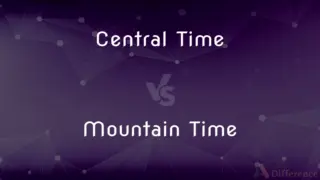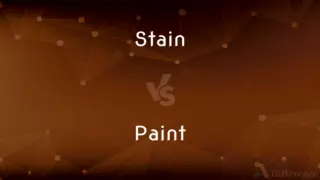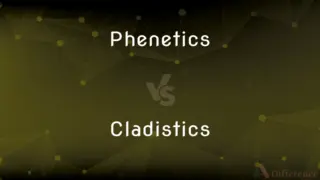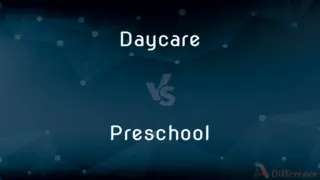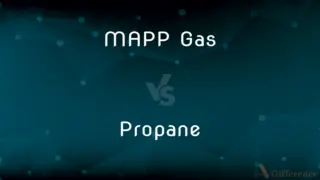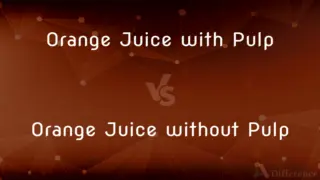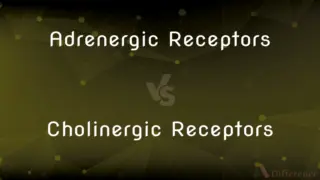Illness vs. Condition — What's the Difference?
By Maham Liaqat & Urooj Arif — Updated on March 24, 2024
Illness refers to a state of poor health involving symptoms and distress, while a condition is a broad term encompassing any health status, not necessarily negative.

Difference Between Illness and Condition
Table of Contents
ADVERTISEMENT
Key Differences
Illness specifically denotes the experience of suffering from a disease or health problem, emphasizing the negative impact on one’s physical or mental state. Conditions, on the other hand, are more inclusive, covering a wide range of health situations, including chronic diseases, disabilities, and even normal variations of human anatomy or physiology.
While illnesses are generally perceived as ailments that can be acute or chronic, causing discomfort or distress, conditions can be lifelong and not always associated with suffering or negative outcomes. For example, a person can have a medical condition like high blood pressure that is managed without causing day-to-day distress, unlike an illness such as the flu, which has a direct negative impact on one's wellbeing.
Illnesses often require medical treatment to alleviate symptoms or cure the disease, focusing on the restoration of health. Conditions might not always need treatment but could require management or accommodation, acknowledging that not all conditions can or need to be "cured."
The perception and management of illness vs. condition can vary greatly depending on cultural, medical, and individual perspectives. Illness often carries a stigma or a sense of sympathy, urging immediate action for recovery, whereas conditions can be seen as part of an individual’s identity or life, requiring understanding and adjustment rather than cure.
Comparison Chart
Definition
A state of poor health with specific symptoms and distress.
A broad term that refers to any health status, including diseases and normal variations.
ADVERTISEMENT
Perception
Often seen negatively, as something to be cured or treated.
Can be neutral, negative, or positive, depending on the context.
Treatment
Focuses on curing or alleviating symptoms.
May involve management, accommodation, or no action.
Impact on Life
Typically causes discomfort or distress and may affect daily activities.
Can be a lifelong situation, not always associated with daily distress.
Medical Approach
Aimed at diagnosis, treatment, and recovery.
Aimed at management, adjustment, or recognition of normal variations.
Societal View
Generally seen as requiring sympathy and immediate action.
Viewed variably, sometimes as part of one's identity or requiring understanding.
Compare with Definitions
Illness
An abnormal state affecting the organism’s normal functioning.
The illness was diagnosed as pneumonia.
Condition
A term for both normal and abnormal health situations.
Pregnancy is considered a normal physiological condition.
Illness
A condition marked by physical or mental distress.
Managing chronic illness requires continuous care.
Condition
A health status that may not necessarily be negative.
Hereditary conditions can influence one’s health.
Illness
A temporary or chronic ailment with a specific diagnosis.
His recent illness was a wake-up call to live healthier.
Condition
A specific situation affecting the body or parts of it.
Skin conditions often require special care.
Illness
The manifestation of symptoms that affect overall health.
The sudden illness left him bedridden for days.
Condition
A medical state, including diseases, disorders, or other health-related issues.
Diabetes is a condition that requires lifestyle adjustments.
Illness
A disease or period of sickness affecting the body or mind.
She took a week off work due to an illness.
Condition
Any variable state of health that might need medical attention.
He was born with a heart condition that doesn’t affect his daily activities.
Illness
A disease or period of sickness affecting the body or mind
I've never missed a day's work through illness
He died after a long illness
Condition
The state of something with regard to its appearance, quality, or working order
The wiring is in good condition
The bridge is in an extremely dangerous condition
Illness
Poor health resulting from disease of body or mind; sickness.
Condition
The circumstances or factors affecting the way in which people live or work, especially with regard to their well-being
Harsh working conditions
Illness
A disease.
Condition
A situation that must exist before something else is possible or permitted
All personnel should comply with this policy as a condition of employment
For a member to borrow money, three conditions have to be met
Illness
The quality of being disagreeable or unpleasant.
Condition
Have a significant influence on or determine (the manner or outcome of something)
National choices are conditioned by the international political economy
Illness
Evil; wickedness.
Condition
Bring (something) into the desired state for use
A product for conditioning leather
Illness
(countable) An instance of a disease or poor health.
Her grandmother had passed away after a long illness.
Suffer form a severe illness
A mild illness
Condition
Apply a conditioner to (the hair)
I condition my hair regularly
Illness
(uncountable) A state of bad health or disease.
Many working days this year have been lost through illness.
Condition
Set prior requirements on (something) before it can occur or be done
Congressmen have sought to limit and condition military and economic aid
Illness
The condition of being ill, evil, or bad; badness; unfavorableness.
Condition
A mode or state of being
We bought a used boat in excellent condition.
Illness
Disease; indisposition; malady; disorder of health; sickness; as, a short or a severe illness.
Condition
Conditions Existing circumstances
Economic conditions have improved. The news reported the latest weather conditions.
Illness
Wrong moral conduct; wickedness.
Condition
(Archaic) Social position; rank.
Illness
Impairment of normal physiological function affecting part or all of an organism
Condition
A state of health
Has the patient's condition deteriorated?.
Condition
A state of physical fitness
Have you exercised enough to get back into condition?.
Condition
A disease or physical ailment
A heart condition.
Condition
One that is indispensable to the appearance or occurrence of another; a prerequisite
Compatibility is a condition of a successful marriage.
Condition
One that restricts or modifies another; a qualification
I'll make you a promise but with one condition.
Condition
(Grammar) The dependent clause of a conditional sentence; protasis.
Condition
(Logic) A proposition on which another proposition depends; the antecedent of a conditional proposition.
Condition
A provision making the effect of a legal instrument contingent on the occurrence of an uncertain future event.
Condition
The event itself.
Condition
To make dependent on a condition or conditions
Use of the cabin is conditioned on your keeping it clean.
Condition
To stipulate as a condition
“He only conditioned that the marriage should not take place before his return” (Jane Austen).
Condition
To cause to be in a certain condition; shape or influence
“Our modern conceptions of historiography [are] conditioned by Western intellectual traditions” (Carol Meyers).
Condition
To accustom (oneself or another) to something; adapt
Had to condition herself to long hours of hard work.
Conditioned the troops to marches at high altitudes.
Condition
To render fit for work or use
Spent weeks conditioning the old car.
Condition
To improve the physical fitness of (the body, for example), as through repeated sessions of strenuous physical activity.
Condition
(Psychology) To cause (an organism) to respond in a specific manner to a previously unrelated stimulus, as in operant conditioning or classical conditioning.
Condition
To treat (the air in a room, for example) by air-conditioning.
Condition
To replace moisture or oils in (hair, for example) by use of a therapeutic product.
Condition
A logical clause or phrase that a conditional statement uses. The phrase can either be true or false.
Condition
A requirement or requisite.
Environmental protection is a condition for sustainability.
What other planets might have the right conditions for life?
The union had a dispute over sick time and other conditions of employment.
Condition
(law) A clause in a contract or agreement indicating that a certain contingency may modify the principal obligation in some way.
Condition
The health status of a medical patient.
My aunt couldn’t walk up the stairs in her condition.
Condition
A certain abnormal state of health; a malady or sickness.
Condition
The state or quality.
National reports on the condition of public education are dismal.
The condition of man can be classified as civilized or uncivilized.
Condition
A particular state of being.
Hypnosis is a peculiar condition of the nervous system.
Steps were taken to ameliorate the condition of slavery.
Security is defined as the condition of not being threatened.
Aging is a condition over which we are powerless.
Condition
(obsolete) The situation of a person or persons, particularly their social and/or economic class, rank.
A man of his condition has no place to make requests.
Condition
To subject to the process of acclimation.
I became conditioned to the absence of seasons in San Diego.
Condition
To subject to different conditions, especially as an exercise.
They were conditioning their shins in their karate class.
Condition
To make dependent on a condition to be fulfilled; to make conditional on.
Condition
(transitive) To place conditions or limitations upon.
Condition
To shape the behaviour of someone to do something.
The children were conditioned to speak up if they had any disagreements.
Condition
(transitive) To treat (the hair) with hair conditioner.
Condition
(transitive) To contract; to stipulate; to agree.
Condition
(transitive) To test or assay, as silk (to ascertain the proportion of moisture it contains).
Condition
To put under conditions; to require to pass a new examination or to make up a specified study, as a condition of remaining in one's class or in college.
To condition a student who has failed in some branch of study
Condition
To impose upon an object those relations or conditions without which knowledge and thought are alleged to be impossible.
Condition
Mode or state of being; state or situation with regard to external circumstances or influences, or to physical or mental integrity, health, strength, etc.; predicament; rank; position, estate.
I am in my conditionA prince, Miranda; I do think, a king.
And O, what man's condition can be worseThan his whom plenty starves and blessings curse?
The new conditions of life.
Condition
Essential quality; property; attribute.
It seemed to us a condition and property of divine powers and beings to be hidden and unseen to others.
Condition
Temperament; disposition; character.
The condition of a saint and the complexion of a devil.
Condition
That which must exist as the occasion or concomitant of something else; that which is requisite in order that something else should take effect; an essential qualification; stipulation; terms specified.
I had as lief take her dowry with this condition, to be whipped at the high cross every morning.
Many are apt to believe remission of sins, but they believe it without the condition of repentance.
Condition
A clause in a contract, or agreement, which has for its object to suspend, to defeat, or in some way to modify, the principal obligation; or, in case of a will, to suspend, revoke, or modify a devise or bequest. It is also the case of a future uncertain event, which may or may not happen, and on the occurrence or non-occurrence of which, the accomplishment, recission, or modification of an obligation or testamentary disposition is made to depend.
Condition
To make terms; to stipulate.
Pay me back my credit,And I'll condition with ye.
Condition
To impose upon an object those relations or conditions without which knowledge and thought are alleged to be impossible.
To think of a thing is to condition.
Condition
To invest with, or limit by, conditions; to burden or qualify by a condition; to impose or be imposed as the condition of.
Seas, that daily gain upon the shore,Have ebb and flow conditioning their march.
Condition
To contract; to stipulate; to agree.
It was conditioned between Saturn and Titan, that Saturn should put to death all his male children.
Condition
To put under conditions; to require to pass a new examination or to make up a specified study, as a condition of remaining in one's class or in college; as, to condition a student who has failed in some branch of study.
Condition
To test or assay, as silk (to ascertain the proportion of moisture it contains).
Condition
Train; acclimate.
Condition
A state at a particular time;
A condition (or state) of disrepair
The current status of the arms negotiations
Condition
A mode of being or form of existence of a person or thing;
The human condition
Condition
An assumption on which rests the validity or effect of something else
Condition
(usually plural) a statement of what is required as part of an agreement;
The contract set out the conditions of the lease
The terms of the treaty were generous
Condition
The state of (good) health (especially in the phrases `in condition' or `in shape' or `out of condition' or `out of shape')
Condition
Information that should be kept in mind when making a decision;
Another consideration is the time it would take
Condition
The procedure that is varied in order to estimate a variable's effect by comparison with a control condition
Condition
Establish a conditioned response
Condition
Train by instruction and practice; especially to teach self-control;
Parents must discipline their children
Is this dog trained?
Condition
Specify as a condition or requirement in a contract or agreement; make an express demand or provision in an agreement;
The will stipulates that she can live in the house for the rest of her life
The contract stipulates the dates of the payments
Condition
Put into a better state;
He conditions old cars
Condition
Apply conditioner to in order to make smooth and shiny;
I condition my hair after washing it
Common Curiosities
How does an illness differ from a condition?
Illnesses specifically refer to states of poor health with negative impacts, while conditions encompass a broader range of health statuses, not all of which are negative.
What is an illness?
An illness is a state of poor health characterized by specific symptoms and distress, often requiring medical treatment.
Is chronic illness a condition?
Yes, chronic illnesses are considered conditions because they are long-lasting health statuses that may significantly impact one’s life.
Do all conditions require treatment?
Not all conditions require treatment; some may require management or adjustments, while others may not need any intervention.
What does condition mean in medical terms?
In medical terms, a condition is any health-related state, including diseases, disorders, disabilities, and normal physiological states.
How is the perception of illness and condition different in society?
Illnesses are often viewed negatively, requiring immediate treatment, whereas conditions might be seen as part of an individual's life, with varying degrees of acceptance and adaptation.
How do medical professionals approach illnesses and conditions differently?
Illnesses often prompt a diagnostic and treatment-focused approach for recovery, while conditions might require a broader strategy encompassing management, accommodation, or lifestyle adjustments.
Can mental health issues be classified as illnesses or conditions?
Yes, mental health issues can be classified as either, depending on their impact and duration; they can be temporary illnesses or long-term conditions.
Is aging considered a condition?
Aging can be seen as a natural condition, a normal part of life’s process, affecting health in various ways.
Can a condition be positive?
Yes, some conditions like pregnancy are considered normal or even positive states of health, despite requiring medical oversight.
Why is it important to distinguish between illness and condition?
Distinguishing between them helps in understanding the medical approach needed—whether it’s treatment, management, or simply awareness.
How can understanding these terms help patients?
Understanding the difference can help patients have realistic expectations about their health outcomes and treatment or management plans.
Can an illness become a condition?
Yes, when an illness becomes chronic or has long-term effects, it can be considered a condition that the individual lives with.
What role does diagnosis play in identifying illness vs. condition?
Diagnosis helps determine if a health issue is an illness needing treatment or a condition that might require management or no intervention.
Are all diseases considered illnesses?
Most diseases are considered illnesses due to their negative impact on health, but the term disease is also used within the broader category of conditions.
Share Your Discovery

Previous Comparison
Kindle vs. Tablet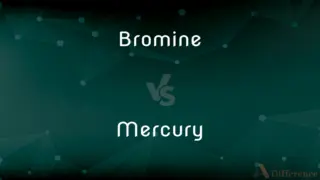
Next Comparison
Bromine vs. MercuryAuthor Spotlight
Written by
Maham LiaqatCo-written by
Urooj ArifUrooj is a skilled content writer at Ask Difference, known for her exceptional ability to simplify complex topics into engaging and informative content. With a passion for research and a flair for clear, concise writing, she consistently delivers articles that resonate with our diverse audience.














